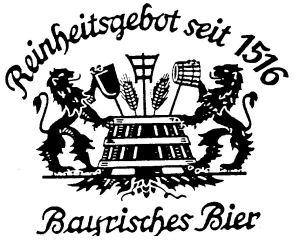 Water, barley and hops; as most beer aficionados know, these are the three main ingredients – along with yeast – that makes up the basis of the world’s third favorite beverage. These are also the only three ingredients allowed in beer according to the famous German Beer Purity law known as Reinheitsgebot (pronounced Rhine-Hites-gaBoat). This year the often misunderstood law celebrates 500 years of legislating German beer production.
Water, barley and hops; as most beer aficionados know, these are the three main ingredients – along with yeast – that makes up the basis of the world’s third favorite beverage. These are also the only three ingredients allowed in beer according to the famous German Beer Purity law known as Reinheitsgebot (pronounced Rhine-Hites-gaBoat). This year the often misunderstood law celebrates 500 years of legislating German beer production.
Originally, the law was a ducal decree issued by Duke Wilhelm IV and his brother Duke Ludwig X on April 23, 1516. The two Bavarian dukes introduced the law at Ingolstadt during a meeting of the assembly of the Estates of Bavaria. It was proposed as a means for the government to regulate the ingredients, processes and taxation of beer produced. At first, the law only covered the southern regions of the Germanic world, later it was adopted by the entire German Empire. The true intent, though, was to keep beer “pure” and safe and keep cheap, sometimes dangerous, ingredients out of beer that was sold to the general public.
In medieval times, unscrupulous brewers often added unhealthy ingredients to beer in order to produce the beverage more economically. Often items such as roots, rushes, mushrooms and animal by-products would be added to the brewing process – sometimes leading to batches of toxic brew.
To fight this practice, the Reinheitsgebot limited the brewers to using only three ingredients in beer – water, barley and hops. Yeast was not listed in the original law because it had not yet been discovered; it was added to the law later after Louis Pastor documented the part the organism plays in fermenting liquids. The law applies to bottom-fermented or lager beers leaving room for top-fermented German ales like Kolsch and Alt to use other grains. The law provides for German ales to contain other malted grains including wheat for Weissbier as well as various forms of sugar derived cane or beet and sugar-derived coloring agents. Chemicals or other processed compounds were still expressly forbidden.
Over the centuries, the law stood the test of time and, though it was struck down by the European Court in 1987 as a restraint of free trade, many German breweries still proudly follow the law. These traditional breweries proudly announce on their labels that they still adhere to the purity law and have no intention of wavering.
At 500-years-old, the Reinheitsgebot stands as the world’s oldest consumer protection law. It is a testament to how a law once thought to be constraining actually served to spark creativity and innovation. Today, there are scores of German beer styles that adhere to the law in a dizzying array of strengths and flavors. More than enough to keep beer-lovers busy tasting the many brews still conforming to the law.
